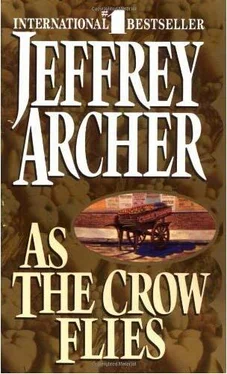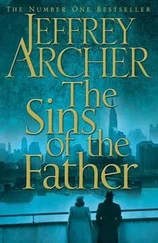"Lord, with me abide . . ."
I told the police that I could think of no reason why Daniel should want to take his own life—that in fact he had just become engaged and I had never known him happier. The inspector then showed me the suicide note: a sheet of foolscap containing a single handwritten paragraph.
"They generally write one, you know," he said.
I didn't know.
I began to read Daniel's neat academic hand:
Now that it's no longer possible for Cathy and me to marry, I have nothing left to live for. For God's sake, take care of the child.
Daniel
I must have repeated those twenty-eight words to myself over a hundred times and still I couldn't make any sense out of them. A week later the doctor confirmed in his report to the coroner that Cathy was not pregnant and had certainly not suffered a miscarriage. I returned to those words again and again. Was I missing some subtle inference, or was his final message something I could never hope to comprehend fully?
"When other helpers fail . . ."
A forensic expert later discovered some writing paper in the grate, but it had been burned to a cinder and the black, brittle remains yielded no clue. Then they showed me an envelope that the police believed the charred letter must have been sent in and asked if I could identify the writing. I studied the stiff, thin upright hand that had written the words "Dr. Daniel Trumper" in purple ink.
"No," I lied. The letter had been hand-delivered, the detective told me, some time earlier that afternoon by a man with a brown moustache and a tweed coat. This was all the undergraduate who caught sight of him could remember, except that he seemed to know his way around.
I asked myself what that evil old lady could possibly have written to Daniel that would have caused him to take his own life; I felt sure the discovery that Guy Trentham was his father would not have been sufficient for such a drastic cause of action—especially as I knew that he and Mrs. Trentham had already met and come to an agreement some three years before.
The police found one other letter on Daniel's desk. It was from the Provost of King's College, London, formally offering him a chair in mathematics.
"And comforts flee . . ."
After I had left the mortuary I drove on to Addenbrooke's Hospital, where they allowed me to spend some time at Cathy's bedside. Although her eyes were open, they betrayed no recognition of me: for nearly an hour she simply stared blankly up at the ceiling while I stood there. When I realized there was nothing I could usefully do I left quietly. The senior psychiatrist, Dr. Stephen Atkins, came bustling out of his office and asked if I could spare him a moment.
The dapper little man in a beautifully tailored suit and large bow tie explained that Cathy was suffering from psychogenic amnesia, sometimes known as hysterical amnesia, and that it could be some time before he was able to assess what her rate of recovery might be. I thanked him and added that I would keep in constant touch. I then drove slowly back to London.
"Help of the helpless, O abide with me . . ."
Daphne was waiting for me in my office and made no comment about the lateness of the hour. I tried to thank her for such endless kindness, but explained that I had to be the one who broke the news to Becky. God knows how I carried out that responsibility without mentioning the purple envelope with its tell-tale handwriting, but I did. Had I told Becky the full story I think she would have gone round to Chester Square that night and killed the woman there and then with her bare hands—I might even have assisted her.
They buried him among his own kind. The college chaplain, who must have carried out this particular duty so many times in the past, stopped to compose himself on three separate occasions.
"In life, in death, O Lord, abide with me . . ."
Becky and I visited Addenbrooke's together every day that week, but Dr. Atkins only confirmed that Cathy's condition remained unchanged; she had not yet spoken. Nevertheless, just the thought of her lying there alone needing our love gave us something else to worry about other than ourselves.
When we arrived back in London late on Friday afternoon Arthur Selwyn was pacing up and down outside my office.
"Someone's broken into Cathy's flat, the lock's been forced," he said even before I had a chance to speak.
"But what could a thief possibly hope to find?"
"The police can't fathom that out either. Nothing seems to have been disturbed."
To the puzzle of what Mrs. Trentham could have written to Daniel I added the mystery of what she could possibly want that belonged to Cathy. After checking over the little room myself I was none the wiser.
Becky and I continued to travel up and down to Cambridge every other day, and then midway through the third week Cathy finally spoke, haltingly to start with, then in bursts while grasping my hand. Then suddenly, without warning, she would go silent again. Sometimes she would rub her forefinger against her thumb just below her chin.
This puzzled even Dr. Atkins.
Dr. Atkins had since then, however, been able to hold extensive conversations with Cathy on several occasions and had even started playing word games to probe her memory. It was his opinion that she had blotted out all recollection of anything connected with Daniel Trumper or with her early life in Australia. It was not uncommon in such cases, he assured us, and even gave the particular state of mind a fine Greek name.
"Should I try and get in touch with her tutor at the University of Melbourne? Or even talk to the staff of the Melrose Hotel and see if they can throw any light on the problem?"
"No," he said, straightening his spotted bow tie. "Don't push her too hard and be prepared for that part of her mind to take some considerable time to recover."
I nodded my agreement.
"Back off" seemed to be Dr. Atkins' favorite expression. "And never forget your wife will be suffering the same trauma."
Seven weeks later they allowed us to take Cathy back to Eaton Square where Becky had prepared a room for her. I had already transferred all Cathy's possessions from the little flat, still unsure if anything was missing following the break-in.
Becky had stored all Cathy's clothes neatly away in the wardrobe and drawers while trying to make the room look as lived in as possible. Some time before, I had taken her watercolor of the Cam from above Daniel's desk and rehung it on the staircase between the Courbet and the Sisley. Yet when Cathy first walked up those stairs on the way to her new room, she passed her own painting without the slightest sign of recognition.
I inquired once again of Dr. Atkins if perhaps we should now write to the University of Melbourne and try to find out something about Cathy's past, but he still counseled against such a move, saying that she must be the one who came forward with any information, and then only when she felt able to do so, not as the result of any pressure from outside.
"But how long do you imagine it might be before her memory is fully restored?"
"Anything from fourteen days to fourteen years, from my experience."
I remember returning to Cathy's room that night, sitting on the end of her bed and holding her hand. I noticed with pleasure that a little color had returned to her cheeks. She smiled and asked me for the first time how the "great barrow" was rumbling along.
"We've declared record profits," I told her. "But far more important, everyone wants to see you back at Number 1."
She thought about this for some time. Then quite simply she said, "I wish you were my father."
In February 1951 Nigel Trentham joined the board of Trumper's. He took his place next to Paul Merrick, to whom he gave a thin smile. I couldn't bring myself to look directly at him. He was a few years younger than me but I vainly considered no one round that table would have thought so.
Читать дальше












